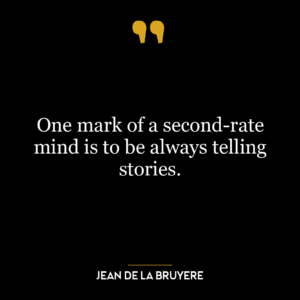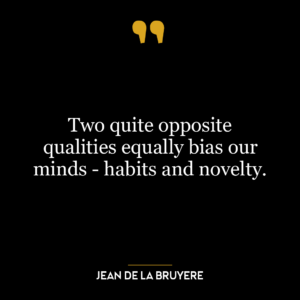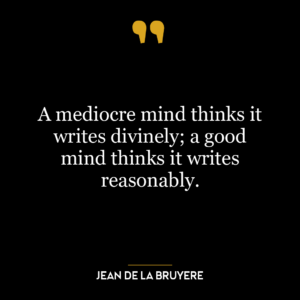This quote is a profound observation on the workings of the human mind. It suggests that our thoughts and perceptions oscillate not between what is objectively right or wrong, but between what makes sense to us and what seems nonsensical.
The term ‘pendulum’ is a metaphor for the constant swing of thoughts and ideas within our minds. It implies a continuous, rhythmic movement, similar to the to-and-fro motion of a pendulum. This metaphor suggests that our thoughts are not static or fixed, but are in a perpetual state of motion and change.
The ‘sense and nonsense’ part of the quote refers to our subjective interpretations of reality. ‘Sense’ refers to what we perceive as logical, rational, or comprehensible. ‘Nonsense’, on the other hand, refers to what we perceive as illogical, irrational, or incomprehensible. The quote suggests that our minds alternate between these two states, rather than between an objective ‘right’ or ‘wrong’.
This idea is significant because it highlights the subjective nature of our thoughts and perceptions. It reminds us that our understanding of the world is not based on some absolute, objective truth, but on our personal interpretations of reality. This perspective can be liberating, as it encourages us to question our assumptions and beliefs, and to be open to different ways of thinking and understanding.
In today’s world, this idea is particularly relevant. We live in a time of unprecedented information overload, where we are constantly bombarded with different ideas, opinions, and perspectives. This can be overwhelming and confusing, and it can be difficult to discern what is ‘right’ or ‘wrong’. But if we approach this situation with the understanding that our minds naturally oscillate between sense and nonsense, we can navigate this complex information landscape with more ease and flexibility.
In terms of personal development, this idea can be a powerful tool for growth and self-improvement. By recognizing that our thoughts and perceptions are not fixed or absolute, but are in a constant state of flux, we can become more open to new ideas and experiences. We can also become more tolerant and understanding of others, as we recognize that their perceptions are just as subjective and changeable as our own. Furthermore, by acknowledging that our minds naturally swing between sense and nonsense, we can learn to be more patient and forgiving with ourselves when we struggle to make sense of things. We can learn to see these moments of confusion or uncertainty not as failures, but as natural and necessary parts of our mental processes.











